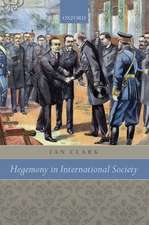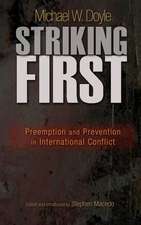US Foreign Policy and the Multinational Force in Lebanon: Vigorous Self-Defense
Autor Corrin Varadyen Limba Engleză Paperback – 2 aug 2018
| Toate formatele și edițiile | Preț | Express |
|---|---|---|
| Paperback (1) | 637.78 lei 6-8 săpt. | |
| Springer International Publishing – 2 aug 2018 | 637.78 lei 6-8 săpt. | |
| Hardback (1) | 643.16 lei 6-8 săpt. | |
| Springer International Publishing – 5 iul 2017 | 643.16 lei 6-8 săpt. |
Preț: 637.78 lei
Preț vechi: 750.33 lei
-15% Nou
Puncte Express: 957
Preț estimativ în valută:
122.04€ • 127.76$ • 100.98£
122.04€ • 127.76$ • 100.98£
Carte tipărită la comandă
Livrare economică 05-19 aprilie
Preluare comenzi: 021 569.72.76
Specificații
ISBN-13: 9783319852898
ISBN-10: 3319852892
Pagini: 273
Ilustrații: XI, 273 p.
Dimensiuni: 148 x 210 mm
Greutate: 0.35 kg
Ediția:Softcover reprint of the original 1st ed. 2017
Editura: Springer International Publishing
Colecția Palgrave Macmillan
Locul publicării:Cham, Switzerland
ISBN-10: 3319852892
Pagini: 273
Ilustrații: XI, 273 p.
Dimensiuni: 148 x 210 mm
Greutate: 0.35 kg
Ediția:Softcover reprint of the original 1st ed. 2017
Editura: Springer International Publishing
Colecția Palgrave Macmillan
Locul publicării:Cham, Switzerland
Cuprins
1. Introduction.- 2. Lebanon: A Crowded State without a Nation.- 3. Discontinuity and Legacy: US Policy in Lebanon and the Middle East.- 4. Operation Peace for Galilee and the Establishment of the MNFI.- 5. Return of the Marines and the Multinational Force II.- 6. The Soviet-Syrian Alliance and the Battle of Souk El Gharb.- 7. The Marine Barracks Bombing and a ‘Vigorous Self Defense’.- 8. Leaving through the Back Door: The Final Days of the US Intervention in Lebanon.- 9. Conclusion: Lessons for the future: the use of force in a peacemaking intervention.
Notă biografică
Corrin Varady is an academic, journalist and entrepreneur. He has finished two masters at the University of New South Wales, AU and the London School of Economics, UK with First Class Honours and completed his PhD at the London School of Economics, UK. Corrin also produced the international feature documentary, The Road to Freedom Peak, on the plight of Ugandan former child soldiers. He lives between Beirut and Johannesburg.
Textul de pe ultima copertă
This book offers a fresh perspective on the impact of the US intervention in Lebanon in 1982 and the decision-making drivers that led the Reagan Administration into the Lebanese Civil War. Based on newly released archival materials from high level Washington officials such as President Reagan, Secretary of State Shultz and Secretary of Defense Weinberger, it argues that the failure of the Reagan Administration to accurately understand the complex political landscape of the Lebanese Civil War resulted in the US-led Multinational Force becoming militarily intertwined in the conflict. This book challenges the notion that Reagan deployed US Marines under the ideals of international peacekeeping, asserting that the US Administration hoped that the Multinational Force would create the political capital that Reagan needed to strengthen the US’ position both in the Middle East and globally. Ultimately, the peacemakers were forced to withdraw as they evolved into antagonists. A case study inthe foreign policy doctrines of key Washington decision-makers throughout the 1980s, this project is perfect for any International Relations scholar or interested reader seeking to understand the links between the mistakes of the Reagan Administration and contemporary US interventions in the Middle East.
Caracteristici
Proves that not all US foreign policy in the Middle East during the late Cold War was aimed at containing the Soviet Union Examines how the use of military force in a peacekeeping context leads to policy deviation and incrementalism Compares local vs. regional vs. global drivers in US policy decision making in the Middle East looking at: local sovereignty, the Palestinian-Israeli conflict, broad Cold War ideology and the emerging transnational peacemaker identity














